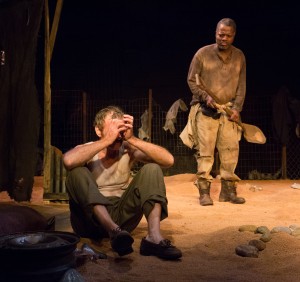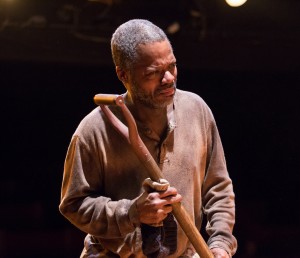
There’s something haunting Roelf (Peter DeLaurier) in the Lantern Theater Company’s atmospheric production of Athol Fugard’s THE TRAIN DRIVER. Disturbed by the memory of a young woman and baby “pulverized” by the train he was driving, the white Afrikaan visits the graveyard of a South African shanty town in aftermath of apartheid.
Gangs of wild dogs and violent youths prowl the shadows. Black gravedigger Simon (Kirk Wendell Brown) lives in a shack among the unnamed, unclaimed dead.
“What is this man doing among the sleeping people?” he asks of the wailing, traumatized Roelf.
A purposefully underdeveloped character, Simon bears witness to Roelf’s distressed search for the woman’s grave. With extended monologues (movingly delivered by DeLaurier) and action quiet almost to the point of inertia, Fugard challenges us to take on the driver’s trauma. The vision of the woman has driven Roelf from his home and family. He has walked the streets of her community in an attempt to exorcise her ghost and now he hopes to end his nightmares by cursing at her bones.
As befits the graveyard setting (scenic design by Lance Kniskern), much of the play takes place in atmospheric near-darkness. Lighting designer Drew Billiau has done much with a dim, limited palette, giving the actors sufficient but understated illumination. Several light touches are sublime: a quick switch from low-frame yellow candlelight to downward-tracing blue moonlight, a transition from near pitch black to delicate nightlight as though our eyes are becoming accustomed to the dark, and a gradual increase of focus and intensity into a spotlight onto a messianic pose.

This Philadelphia premiere of THE TRAIN DRIVER marks another successful return to Fugard’s work for the Lantern, after similarly strong productions of “Master Harold” … and the Boys (2006), Sizwe Bansi is Dead (2009), and The Island (2011). His small casts and lyrical scripts seem to fit the theater’s space and mission perfectly.
Director Matt Pfieffer might have varied tempo more (DeLaurier spends much of the play in screeching torment) and brought more empathetic chemistry into the characters’ interplay, but this could have ruined the disturbing alienation which builds from Fugard’s script. Dangerous ghosts seem to lurk in the shadows. The allegorical play captures the fullness of South African society beyond the scrubby graveyard, and the performances and production fulfill the promise of this affecting parable.
Roelf’s guilt lies not in his inability to stop the train, but in his chromatic culpability for the impoverishment which drove the young woman to kill herself. He rails against the state of the woman’s community and their graves, but he’s coming to realize that “white people got no idea about what it’s like”. (He calls himself “fully bilingual” because he speaks the two white languages of South Africa, English and Afrikaans, only picking up the odd Bantu word.)
With a fittingly bleak ending, Roelf passes his guilt and loss onto Simon, whose ruin is all the more poignant because he only had a shovel to lose. Roeld might never escape his ghosts, but as he puts it, “Let me ask you if God is also having nightmares every night when he looks into those big eyes with no hope in them.” Its that type of play, devastating and unforgiving. [St. Stephan’s Theater, 10th and Ludlow Streets] April 10-May 4, 2014, lanterntheater.org.
Extras:
- Enter by April 22nd to win FREE tickets to THE TRAIN DRIVER!
- Read the Phindie review of 2011’s The Island
- Read Jim Rutter’s Inquirer review of THE TRAIN DRIVER

Beautifully crafted review of Fugard’s play.